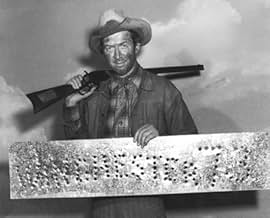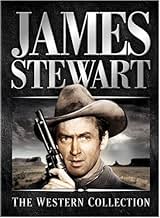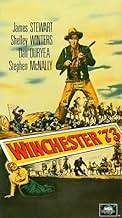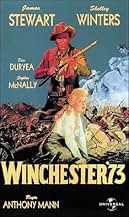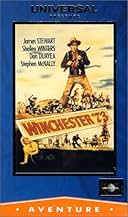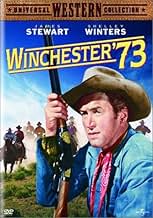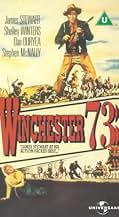IMDb रेटिंग
7.6/10
23 हज़ार
आपकी रेटिंग
अपनी भाषा में प्लॉट जोड़ेंA cowboy's obsession with a stolen rifle leads to a bullet-ridden odyssey through the American West.A cowboy's obsession with a stolen rifle leads to a bullet-ridden odyssey through the American West.A cowboy's obsession with a stolen rifle leads to a bullet-ridden odyssey through the American West.
- निर्देशक
- लेखक
- स्टार
- पुरस्कार
- 1 जीत और कुल 1 नामांकन
Tony Curtis
- Doan
- (as Anthony Curtis)
Victor Adamson
- Townsman
- (बिना क्रेडिट के)
Robert Anderson
- Basset
- (बिना क्रेडिट के)
फ़ीचर्ड समीक्षाएं
One of the great Westerns, Winchester '73 is noteworthy film in many respects, not least because it marked the start of one of the great creative partnerships in the genre, that between director Anthony Mann and James Stewart. Mann had until this time been working successful in low budget films, crafting a series of B-noirs, which have a following on their own account today: titles such as T-Men (1947), Border Incident (1949) and Raw Deal (1948). 1950 brought his first big assignment with the current production, a film which many critics point to as marking the western's emergence into maturity during the decade.
It was also something of a career change for Stewart, whose many roles during his early career had been based around a friendly and frequently homespun persona. Only such films as the documentary noir Call Northside 777, of two years earlier, or odd moments during It's A Wonderful Life hinted at something darker, almost pathological, lurking beneath the amiable exterior. The series of Westerns made with Mann brought this something else to the surface; suddenly this was a dogged, vengeful Stewart, still playing honest men, but men who had often suffered a great wrong and were driven to put things right. (Hitchcock recognised this neurotic dimension to the actor as during the same period he also used him to great effect). Thus in The Man From Laramie (1955) the hero would have his livelihood burnt and be dragged behind a horse by a psychotic, while in Bend Of The River (1952) he is cast out to survive on his own from a wagon train.
As Lin McAdam in Winchester '73 he is already hunting someone who has wronged him: "...chasing him since I can't remember" and then, to add to it all, has a prize rifle stolen from him by his prey after an intense competition. The film focuses on the eponymous weapon as it passes through various hands and Stewart's parallel tracking of his human prey. In some ways his dogged perseverance reminds one of Ethan Edwards' in The Searchers (1956), where obsessive behaviour by a man searching for answers for matters as much internal as external also drives the plot.
McAdam's single-mindedness is a characteristic of many of Mann's Western heroes, a state of mind that approaches the unbalanced in The Naked Spur (1953). Of course McAdam is after getting back his rifle almost as much as he is after vengeance. Later films also feature the wandering weapon storyline - such as American Gun, or The Gun (1974) - the tale of a firearm passing through various hands provides a morality tale hedged around the prevalence of armaments. Winchester '73's central narrative thread has an entirely different purpose, one not generally concerned with social comment. When McAdam's gun is stolen the loss is seen in far more private, almost psychological terms, as if a piece of his personal honour is taken along with the rifle. In fact honour plays a large part in this film: it is either symbolically removed, as in the case of Dutch Henry Brown's early theft; much reduced as shown in the cowardice and subsequent humiliation of Charles Drake; or largely absent, as with the trader selling arms of questionable worth to the warring Indians. And of course besides McAdam's fury at the opening theft, what also drives him on is the dishonourable (because he's shot in the back by someone he trusted) loss of his father.
As critics such as Phil Hardy have noted, during the film McAdam encounters a series of potent father figures, such as Wyatt Earp, Sergeant Wilkes, and Lamont - the presence of who serves to echo and reinforce his own loss. To prove himself worthy of his late father in his own eyes, McAdams has to do is secure the something special he has lost and exact suitable vengeance. The look of the exhausted McAdam's face at the close of the film as he rejoins Lola (Shelley Winters) and his sidekick High Spade (Millard Mitchell) says it all.
In making Winchester '73, Mann was at last given the chance and the budget to make the most of his talents. His previous films had mostly been set amongst cramped and dangerous urban environments. Settling into a new genre he at once showed great response to landscape, and not just in the epic moments like the Indians' attack on Sergeant Wilkes' party. In many of his Westerns it is noticeable that the territory through which characters move is not just the geography of the west but also often a physical echo of the ongoing human drama, as exteriors reflect the emotional state of his characters. Thus at the start of the film we see McAdam moving through open vistas, before his first encounter set amidst the excited human clutter of Dodge. As events proceed, the landscape becomes more and more inhospitable until the film's climax fought out around and amidst bare rocks - a claustrophobic and harsh environment, aptly trapping the two adversaries in their uncompromising duel. Many traditional Westerns tended to save the psychological drama for interiors and the action, taken plain and simple, for outside. Mann's achievement was to resolve this pattern into something more subtle and expressive, opening the way for the deeper resonances in the genre which were to follow.
Winchester '73's plot, which involves several locations and a range of characters and events, could easily have proved episodic. Mann manages to draw all these elements together into a satisfying unity while still allowing the supporting actors to shine and do their thing. One standout is Dan Duryea, in an entirely characteristic performance as Waco Johnny Dean. Dean and Dutch Henry Brown (excellently done by the underrated Stephen McNally) provide excellent turns in villainy. There's a nice touch of symmetry too as the end draws near: McAdam, who had earlier been humiliated by Brown over a drink of milk back in Dodge, faces down Dean over another drink in the cantina.
The excellent DVD transfer shows the film in its best light, not least the splendid black and white photography. Mann rarely moves his camera, but instead shows mastery of composition within the frame and his direction of actors. The depth of focus benefits from the clear digital image, reproduced in the correct academy ratio. If this isn't enough to wet the appetite of any western fan, then there is an unmissable bonus. James Stewart recorded an interview commentary for the title when it appeared on laserdisc years back, and this is included - perhaps one of the very rare occasions that a representative of Hollywood's golden age appears in this way on a western DVD. (I can only otherwise think of Maureen O'Hara's commentary to the Region 1 special edition of Rio Grande.)
It was also something of a career change for Stewart, whose many roles during his early career had been based around a friendly and frequently homespun persona. Only such films as the documentary noir Call Northside 777, of two years earlier, or odd moments during It's A Wonderful Life hinted at something darker, almost pathological, lurking beneath the amiable exterior. The series of Westerns made with Mann brought this something else to the surface; suddenly this was a dogged, vengeful Stewart, still playing honest men, but men who had often suffered a great wrong and were driven to put things right. (Hitchcock recognised this neurotic dimension to the actor as during the same period he also used him to great effect). Thus in The Man From Laramie (1955) the hero would have his livelihood burnt and be dragged behind a horse by a psychotic, while in Bend Of The River (1952) he is cast out to survive on his own from a wagon train.
As Lin McAdam in Winchester '73 he is already hunting someone who has wronged him: "...chasing him since I can't remember" and then, to add to it all, has a prize rifle stolen from him by his prey after an intense competition. The film focuses on the eponymous weapon as it passes through various hands and Stewart's parallel tracking of his human prey. In some ways his dogged perseverance reminds one of Ethan Edwards' in The Searchers (1956), where obsessive behaviour by a man searching for answers for matters as much internal as external also drives the plot.
McAdam's single-mindedness is a characteristic of many of Mann's Western heroes, a state of mind that approaches the unbalanced in The Naked Spur (1953). Of course McAdam is after getting back his rifle almost as much as he is after vengeance. Later films also feature the wandering weapon storyline - such as American Gun, or The Gun (1974) - the tale of a firearm passing through various hands provides a morality tale hedged around the prevalence of armaments. Winchester '73's central narrative thread has an entirely different purpose, one not generally concerned with social comment. When McAdam's gun is stolen the loss is seen in far more private, almost psychological terms, as if a piece of his personal honour is taken along with the rifle. In fact honour plays a large part in this film: it is either symbolically removed, as in the case of Dutch Henry Brown's early theft; much reduced as shown in the cowardice and subsequent humiliation of Charles Drake; or largely absent, as with the trader selling arms of questionable worth to the warring Indians. And of course besides McAdam's fury at the opening theft, what also drives him on is the dishonourable (because he's shot in the back by someone he trusted) loss of his father.
As critics such as Phil Hardy have noted, during the film McAdam encounters a series of potent father figures, such as Wyatt Earp, Sergeant Wilkes, and Lamont - the presence of who serves to echo and reinforce his own loss. To prove himself worthy of his late father in his own eyes, McAdams has to do is secure the something special he has lost and exact suitable vengeance. The look of the exhausted McAdam's face at the close of the film as he rejoins Lola (Shelley Winters) and his sidekick High Spade (Millard Mitchell) says it all.
In making Winchester '73, Mann was at last given the chance and the budget to make the most of his talents. His previous films had mostly been set amongst cramped and dangerous urban environments. Settling into a new genre he at once showed great response to landscape, and not just in the epic moments like the Indians' attack on Sergeant Wilkes' party. In many of his Westerns it is noticeable that the territory through which characters move is not just the geography of the west but also often a physical echo of the ongoing human drama, as exteriors reflect the emotional state of his characters. Thus at the start of the film we see McAdam moving through open vistas, before his first encounter set amidst the excited human clutter of Dodge. As events proceed, the landscape becomes more and more inhospitable until the film's climax fought out around and amidst bare rocks - a claustrophobic and harsh environment, aptly trapping the two adversaries in their uncompromising duel. Many traditional Westerns tended to save the psychological drama for interiors and the action, taken plain and simple, for outside. Mann's achievement was to resolve this pattern into something more subtle and expressive, opening the way for the deeper resonances in the genre which were to follow.
Winchester '73's plot, which involves several locations and a range of characters and events, could easily have proved episodic. Mann manages to draw all these elements together into a satisfying unity while still allowing the supporting actors to shine and do their thing. One standout is Dan Duryea, in an entirely characteristic performance as Waco Johnny Dean. Dean and Dutch Henry Brown (excellently done by the underrated Stephen McNally) provide excellent turns in villainy. There's a nice touch of symmetry too as the end draws near: McAdam, who had earlier been humiliated by Brown over a drink of milk back in Dodge, faces down Dean over another drink in the cantina.
The excellent DVD transfer shows the film in its best light, not least the splendid black and white photography. Mann rarely moves his camera, but instead shows mastery of composition within the frame and his direction of actors. The depth of focus benefits from the clear digital image, reproduced in the correct academy ratio. If this isn't enough to wet the appetite of any western fan, then there is an unmissable bonus. James Stewart recorded an interview commentary for the title when it appeared on laserdisc years back, and this is included - perhaps one of the very rare occasions that a representative of Hollywood's golden age appears in this way on a western DVD. (I can only otherwise think of Maureen O'Hara's commentary to the Region 1 special edition of Rio Grande.)
The traditional Western is synonymous with wide open spaces, clearcut morality, inevitable storylines, the optimistic faith in a hero's ability to shape his own destiny, to escape his past. These qualities reflect directly the American sense of self, the self-shaping Dream, the pushing of boundaries and frontiers, which is why the genre is still alluded to by opportunistic politicians. With some noble exceptions (eg Wellman, Hawks), the Western was healthily free of neuroses or real anxiety. Anthony Mann changed all that forever, and this first foray into the genre is one of the most violent, vivid, complex, not to say exciting Westerns ever made.
The traditional Western depends on a hero who exemplifies rugged wholesomeness, whatever misfortunes he may have had in the past, a supporter of order and right, who dominates the film, removes its obstacles, restores harmony in effect; and an obvious villain, who often, ironically, drives the plot, forces the hero into certain actions. The difference between the two is often delineated as mythically simple as the wearing of white or black hats.
Mann's background was in film noir, a genre antithetical to wide open spaces and optimism. Noir was neurotically charged, focusing on the dissolution of an unstable protagonist, where morality is blurred, the hero is as often the villain, trapped in an interior-labyrinth of his own making, a passive victim to destiny. Noir is about regress not progress, the interrogating and denying of modes and signs of representation, not the creation and confirmation of them.
WINCHESTER 73 is fraught with noir anxiety. Noir is often considered a psychological genre, visualising the traumas of its protagonist's head. 73 does this too, and is all the more disturbing in that that protagonist is lovely, homespun Jimmy Stewart, initiating here his great run of difficult films with Mann and Hitchcock. In many ways, good-natured and sweet, representing right and trying to restore disruptions to the natural order, he is also a near-lunatic who will stop at nothing to achieve murderous revenge, whose relentless quest mirrors Ethan Edwards in THE SEARCHERS in its inhuman persistance, whose human instincts are frayed by this quest, and whose bursts of violence are genuinely terrifying to witness.
As in noir, his anxiety has a psychological base - unlike most 'healthy' heroes who have outgrown (symbolically killed) their fathers, McAdam's father was killed before he could complete the process; his chasing his brother is less moral revenge than an anguished protest against stunted growth. The climactic shoot-out is not cathartic: McAdam staggers back into 'normal' society, like he's just witnessed some of the world's most ghastly horrors.
What is most unsettling about the film is that it's not really about a hero or a villain at all, but an inanimate piece of weoponry that drives the action. 73 opens with the gun of the title privileged, on display behind a glass window, while its admirers are trapped, squashed, undifferentiated, framed, admiring it outside. Throughout the film, human power is reduced to the most arbitrary of signifiers - names change; Lin and Dutch mime shooting each other because they've no guns; quests lose their moral vitality and their practitioners veer close to madness; armies have to ask for help from Confederate strangers to fight battles; a man becomes worthy of respect only when he mentions his name; another man is revealed as a coward when he abandons his fiancee to the Indians; the gun retains its prestige, power, wholeness.
It's not the revenge plot which drives the film, but the story of the gun; this wrenches the film out of conventional expectations, and creates an eerie, alienating, modern feel. We become so caught up in the revenge plot that when we follow, with the gun, another plot entirely, we feel slightly bewildered.
This emphasis on the gun, symbol of potent masculinity, actually allows for a critique of that masculinity, revealing pointless elaborate rituals at the expense of society and order; brute capitalist greed; murderous Indian-traders who defraud both seller and enemy; cowards; psychotic killers; before returning to its 'true' owner, a broken hero thoroughly compromised, who has become as murderous as the murderer he seeks. The gun is never imprinted with the name of its owner, not only because there is no fixed owner, but because there is no fixed masculinity, an insight anathema to the traditional Western.
73 brilliantly invokes Western myths - Wyatt Earp, Dodge City, the Cavalry, the Civil War, the wide open West - only to undermine them. Earp has an inflated reputation that is all name but never proven - Dodge City is no safer against outlaws than anywhere else; the Cavalry is inept (Custer has just lost Little Big Horn) and the bitter feud of the War is shown to be irrelevant. The myth of the open West is a site for a very closed, inescapable, circular plot which traps its characters, refuses to allow them shape their destiny, but allowing it to shape them.
The old John Ford silhouette of riders on a vast mountain is reprised, but signals here not progress but repetition and circularity. But for all its deconstruction, the film is also tangibly vivid in a way few Westerns ever achieve. Mann's incisive technique intrudes his camera in crucial positions, alternating revealing distance with intense examination, making the saloon doors and stagecoaches seem thrillingly alive and lived in.
The traditional Western depends on a hero who exemplifies rugged wholesomeness, whatever misfortunes he may have had in the past, a supporter of order and right, who dominates the film, removes its obstacles, restores harmony in effect; and an obvious villain, who often, ironically, drives the plot, forces the hero into certain actions. The difference between the two is often delineated as mythically simple as the wearing of white or black hats.
Mann's background was in film noir, a genre antithetical to wide open spaces and optimism. Noir was neurotically charged, focusing on the dissolution of an unstable protagonist, where morality is blurred, the hero is as often the villain, trapped in an interior-labyrinth of his own making, a passive victim to destiny. Noir is about regress not progress, the interrogating and denying of modes and signs of representation, not the creation and confirmation of them.
WINCHESTER 73 is fraught with noir anxiety. Noir is often considered a psychological genre, visualising the traumas of its protagonist's head. 73 does this too, and is all the more disturbing in that that protagonist is lovely, homespun Jimmy Stewart, initiating here his great run of difficult films with Mann and Hitchcock. In many ways, good-natured and sweet, representing right and trying to restore disruptions to the natural order, he is also a near-lunatic who will stop at nothing to achieve murderous revenge, whose relentless quest mirrors Ethan Edwards in THE SEARCHERS in its inhuman persistance, whose human instincts are frayed by this quest, and whose bursts of violence are genuinely terrifying to witness.
As in noir, his anxiety has a psychological base - unlike most 'healthy' heroes who have outgrown (symbolically killed) their fathers, McAdam's father was killed before he could complete the process; his chasing his brother is less moral revenge than an anguished protest against stunted growth. The climactic shoot-out is not cathartic: McAdam staggers back into 'normal' society, like he's just witnessed some of the world's most ghastly horrors.
What is most unsettling about the film is that it's not really about a hero or a villain at all, but an inanimate piece of weoponry that drives the action. 73 opens with the gun of the title privileged, on display behind a glass window, while its admirers are trapped, squashed, undifferentiated, framed, admiring it outside. Throughout the film, human power is reduced to the most arbitrary of signifiers - names change; Lin and Dutch mime shooting each other because they've no guns; quests lose their moral vitality and their practitioners veer close to madness; armies have to ask for help from Confederate strangers to fight battles; a man becomes worthy of respect only when he mentions his name; another man is revealed as a coward when he abandons his fiancee to the Indians; the gun retains its prestige, power, wholeness.
It's not the revenge plot which drives the film, but the story of the gun; this wrenches the film out of conventional expectations, and creates an eerie, alienating, modern feel. We become so caught up in the revenge plot that when we follow, with the gun, another plot entirely, we feel slightly bewildered.
This emphasis on the gun, symbol of potent masculinity, actually allows for a critique of that masculinity, revealing pointless elaborate rituals at the expense of society and order; brute capitalist greed; murderous Indian-traders who defraud both seller and enemy; cowards; psychotic killers; before returning to its 'true' owner, a broken hero thoroughly compromised, who has become as murderous as the murderer he seeks. The gun is never imprinted with the name of its owner, not only because there is no fixed owner, but because there is no fixed masculinity, an insight anathema to the traditional Western.
73 brilliantly invokes Western myths - Wyatt Earp, Dodge City, the Cavalry, the Civil War, the wide open West - only to undermine them. Earp has an inflated reputation that is all name but never proven - Dodge City is no safer against outlaws than anywhere else; the Cavalry is inept (Custer has just lost Little Big Horn) and the bitter feud of the War is shown to be irrelevant. The myth of the open West is a site for a very closed, inescapable, circular plot which traps its characters, refuses to allow them shape their destiny, but allowing it to shape them.
The old John Ford silhouette of riders on a vast mountain is reprised, but signals here not progress but repetition and circularity. But for all its deconstruction, the film is also tangibly vivid in a way few Westerns ever achieve. Mann's incisive technique intrudes his camera in crucial positions, alternating revealing distance with intense examination, making the saloon doors and stagecoaches seem thrillingly alive and lived in.
Winchester '73 is one of the most enduring and popular films of James Stewart's career, for several reasons; it was the first of five teamings with brilliant, underrated director Anthony Mann, who retooled Stewart's drawling, 'aw-shucks' persona into a laconic, edgier, more flawed hero; it featured a brilliant cast, including Shelley Winters, Dan Duryea, Stephen McNally, John McIntyre, and, in VERY early appearances, Rock Hudson and Tony Curtis; visually, it is spectacular, one of the most beautiful Black and White films ever made, with deep-focus photography highlighting rugged Arizona settings that literally leap from the screen; and, most of all, it is a terrific variation of 'Cain and Abel', told through the premise of the search for a 'one-of-a-kind' rifle Stewart wins in a competition, then loses through treachery. It's the kind of film that offers new insights each time you view it, as the actions and motivations of 'good' brother Stewart and 'bad' brother McNally become better understood.
What truly makes this DVD an 'essential', though, is the bonus track...Described as an 'interview' with Stewart, it is actually an audio commentary that runs through the film, offering not only his reflections about the making of Winchester '73, but insights about his career, working with John Ford, Alfred Hitchcock, and his great friends Henry Fonda and John Wayne, even a nice story about his long-time mount, Pie. Recorded several years ago for the laserdisc edition of Winchester '73, it provides a rare opportunity to hear a screen legend reminisce (and makes you wish Wayne and Fonda had lived long enough to have offered personal observations about THEIR classic films!)
This is a DVD NOT to be missed!
What truly makes this DVD an 'essential', though, is the bonus track...Described as an 'interview' with Stewart, it is actually an audio commentary that runs through the film, offering not only his reflections about the making of Winchester '73, but insights about his career, working with John Ford, Alfred Hitchcock, and his great friends Henry Fonda and John Wayne, even a nice story about his long-time mount, Pie. Recorded several years ago for the laserdisc edition of Winchester '73, it provides a rare opportunity to hear a screen legend reminisce (and makes you wish Wayne and Fonda had lived long enough to have offered personal observations about THEIR classic films!)
This is a DVD NOT to be missed!
This stirring western spins the tale of the famous rifle of the early west that was coveted by one and all. James Stewart is the cowboy who wins the prized Winchester in a shootout, only to lose it in a robbery. The story details Stewart's pursuit of the rifle and a certain man through the film. The rifle changes hands time after time, as though the owner is fated to lose it through violence. The picture has plenty of action and suspense as Stewart closes in on his quarry. A great cast supports Stewart here, namely Stephen McNally, Dan Duryea, Millard Mitchell, John McIntire and Jay C. Flippen. Shelley Winters seems miscast here and the purpose of her role is rather obscure. Tony Curtis and Rock Hudson, teen heartthrobs in later years, have brief but good roles.
There are several sections. The first is the set up - Jimmy Stewart and Millard Mitchell ride into town and run smack dab into Wyatt Earp, who takes their guns away, temporarily of course, or we'd have no movie. Then we see that Jimmy's looking for someone, and we get the gun shooting contest between him and his nemesis, Dutch Henry Brown, played by an evil evil Stephen McNally. We don't understand why Jimmy hates him so, or is hunting him. We also get a brief appearance by saloon gal Shelley Winters.
Then Jimmy gets jumped and he starts the real search of the film, this time for the Winchester he's won fair and square, but which the jealous Dutch steals. This is one of the first Winchesters, and it's considered very valuable, mention is made that only a few other people like President Grant have them.
Along the way, we meet a besieged U. S. army company, are attacked by Indians, see Shelley's boyfriend Charles Drake cringe in terror during the raid (he's very effective as a man haunted by his fear of confrontation and gorgeous to boot...Shelley is a fool to pick Jimmy, even if he isn't afraid of anything), and Dan Duryea pops in as Dutch's even MORE weaselly pal who has eyes for Shelley too. Finally, as we expected, Jimmy catches up with Dutch, but there is a twist that knocks my socks off every time, even though I've seen the movie before.
The Indian threat seems very real in this movie, and mention is made of Little Big Horn, which has just happened. The talk about the raid is not too embarrassing, although the Indian leader is played by Rock Hudson in full makeup, who I didn't recognize.
The supporting cast is superb, most notably John McIntire and Jay C. Flippen, who were to me the most intriguing members of the cast. I could have watched a whole movie of John McIntire playing cards, and another whole movie of Jay C. Flippen just sitting around reminiscing about the Civil War. Why couldn't they once just put these two guys in the front of a movie? They make it all work, along with Millard Mitchell, who is a lighthearted, loyal buddy to Jimmy, the man with the dark secret.
Then Jimmy gets jumped and he starts the real search of the film, this time for the Winchester he's won fair and square, but which the jealous Dutch steals. This is one of the first Winchesters, and it's considered very valuable, mention is made that only a few other people like President Grant have them.
Along the way, we meet a besieged U. S. army company, are attacked by Indians, see Shelley's boyfriend Charles Drake cringe in terror during the raid (he's very effective as a man haunted by his fear of confrontation and gorgeous to boot...Shelley is a fool to pick Jimmy, even if he isn't afraid of anything), and Dan Duryea pops in as Dutch's even MORE weaselly pal who has eyes for Shelley too. Finally, as we expected, Jimmy catches up with Dutch, but there is a twist that knocks my socks off every time, even though I've seen the movie before.
The Indian threat seems very real in this movie, and mention is made of Little Big Horn, which has just happened. The talk about the raid is not too embarrassing, although the Indian leader is played by Rock Hudson in full makeup, who I didn't recognize.
The supporting cast is superb, most notably John McIntire and Jay C. Flippen, who were to me the most intriguing members of the cast. I could have watched a whole movie of John McIntire playing cards, and another whole movie of Jay C. Flippen just sitting around reminiscing about the Civil War. Why couldn't they once just put these two guys in the front of a movie? They make it all work, along with Millard Mitchell, who is a lighthearted, loyal buddy to Jimmy, the man with the dark secret.
क्या आपको पता है
- ट्रिवियाJames Stewart credited this film with saving and redefining his career after a series of postwar flops threatened to seriously damage it.
- गूफ़This movie is based on a rifle-shooting competition held in Dodge City on 4 July 1876. During a poker game in the movie, Dutch refers to a "Dead Man's Hand". This refers to the poker hand 'Wild Bill' Hickok was holding when he was shot in the back by Jack McCall on 2 August 1876 - less than a month later. It was too soon for the "Dead Man's Hand" to be a famous phrase. However, per IMDb guidelines for Anachronisms, "a good deal of leeway" is allowed; linguistic anachronisms are usually excused (modern words in historical films) - "always bear in mind that it's entertainment not documentary."
- भाव
Wyatt Earp: That's Dutch Henry Brown. I thought you said you didn't know him.
Lin McAdam: I said I didn't recall the name.
- क्रेज़ी क्रेडिटThe film's opening prologue states: This is a story of the Winchester Rifle Model 1873 "The gun that won the West" To cowman, outlaw, peace officer or soldier, the Winchester '73 was a treasured possession. An Indian would sell his soul to own one . . .
टॉप पसंद
रेटिंग देने के लिए साइन-इन करें और वैयक्तिकृत सुझावों के लिए वॉचलिस्ट करें
- How long is Winchester '73?Alexa द्वारा संचालित
विवरण
- रिलीज़ की तारीख़
- कंट्री ऑफ़ ओरिजिन
- आधिकारिक साइट
- भाषा
- इस रूप में भी जाना जाता है
- Winchester 73
- फ़िल्माने की जगहें
- उत्पादन कंपनी
- IMDbPro पर और कंपनी क्रेडिट देखें
बॉक्स ऑफ़िस
- दुनिया भर में सकल
- $3,172
- चलने की अवधि
- 1 घं 32 मि(92 min)
- रंग
- पक्ष अनुपात
- 1.37 : 1
इस पेज में योगदान दें
किसी बदलाव का सुझाव दें या अनुपलब्ध कॉन्टेंट जोड़ें

